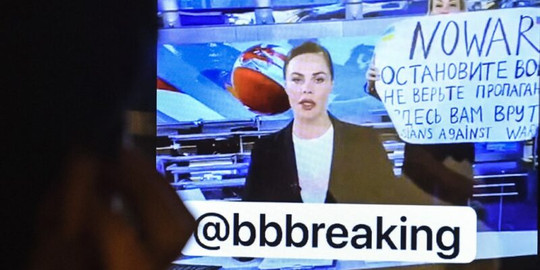Marina Ovsyannikova interrupted the evening broadcast on Russian state TV network Channel One with a sign blasting Russian war against Ukraine. “Stop the war, no to war!” she shouted. Ovsyannikova was promptly arrested. The authorities say she will face misdemeanor charges for violating Russia’s new ban on so-called “disinformation” about Russian army operations.
The law, passed by State Duma in early March, increases penalties for spreading alleged disinformation about the Russian armed forces and has led to the closure or suspension of dozens of independent media in Russia.
In a prerecorded message shared on social media after the live-television incident, Ovsyannikova condemned the “Russian aggression of Ukraine” and regretted her job promoting “Putin’s propaganda” in Channel One.
According to her lawyer, she could face up to 15 years in prison.
"I expect that my client, Marina Ovsyannikova, will face not an administrative charge but a criminal one under the new law which carries a penalty of up to 15 years in jail," lawyer Daniil Berman told AFP.
On March 15, French president Emmanuel Macron said he would discuss with Russian president Vladimir Putin offering protection for Ovsyannikova. He also said France will launch diplomatic efforts to offer her ”protection either at the embassy but also protection through asylum”.
IFJ General Secretary, Anthony Bellanger, said: “We stand in solidarity with Russian journalist Marina Ovsyannikova who is a victim of the recent abusive media law passed in Russia. We call on the Russian authorities to release her immediately and welcome the international efforts to secure her release”

